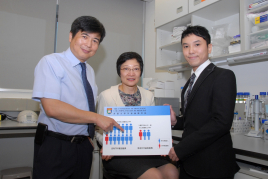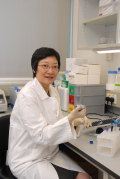Media
HKU identifies genetic variation that explains and predicts Thyrotoxic Periodic Paralysis (TPP) DNA screening helps preventing TPP attacks
11 Sep 2012
A team of researchers at The University of Hong Kong (HKU), working with other experts from Hospital Authority hospitals, has discovered a DNA variation located on chromosome 17q24.3 near KCNJ2 gene was significantly associated with thyrotoxic periodic paralysis (TPP). TPP is a common complication of thyrotoxicosis. The researchers observed that the variation is much more frequent in the TPP subjects than in the thyrotoxic subjects without TPP. Individuals with the DNA variant have a 1 in 3 chance of having TPP, whereas those without the variant only have a 1 in 14 chance of developing this condition. Screening this DNA variation in individuals with thyrotoxicosis may be useful to identify at risk subjects to prevent TPP attacks. The important finding has just been published in the leading scientific genetic research journal “Nature Genetics”.
“This is definitely a breakthrough finding in the field,” said Professor Annie Kung Wai-chee, senior author of the study and Honorary Clinical Professor of the Department of Medicine, HKU Li Ka Shing Faculty of Medicine. “We have been researching into this special and potentially lethal condition for the past 20 years. Epidemiology study shows that TPP is common in Southern Chinese but not Northern Chinese. In 2010, we have identified a novel gene KCNJ18 which could affect TPP susceptibility. Interestingly, only one out of 83 Hong Kong TPP subjects had KCNJ18 mutation, leading us to hypothesize that there could be other mutation(s) or DNA variation(s) affecting TPP susceptibility in our population. The findings from the present study definitely help to resolve the mystery of TPP in Chinese. In addition to mutation, some common DNA variations are also important in TPP determination.”
About TPP
TPP is a common complication of thyrotoxicosis associated with hypokalaemia, resulting in acute muscle paralysis among Asian populations especially in men but is rare in Western populations. In Hong Kong, TPP occurs in up to 13% of male thyrotoxic patients. It can lead to potentially life threatening complications, such as respiratory muscle paralysis or cardiac arrhythmia. The attack usually occurs after a heavy carbohydrate meal or in the middle of the night, and the patient finds himself unable to get up from his bed in the morning. The pathogenesis of TPP remains largely unclear.
Research methodology
Around 500,000 DNA markers were studied in 69 TPP subjects and 775 healthy controls. Subsequent replication was done in another group of 54 cases and 395 healthy controls. Since TPP is a complication of thyrotoxicosis, the team therefore performed a TPP versus hyperthyroidism comparison using 123 cases with TPP (from discovery and replication phases) and 83 southern Chinese subjects with hyperthyroidism but not TPP who served as controls.
Study results
The study found that a DNA variation located on chromosome 17q24.3 near KCNJ2 gene was significantly associated with TPP. Researchers found that the DNA variation is found more frequent in the TPP subjects than in the thyrotoxic subjects without TPP. Individuals with the DNA variant have a 1 in 3 chance of having TPP, whereas those without the variant only have a 1 in 14 chance of developing this condition. The DNA region harbouring this DNA variation could potentially affect KCNJ2 gene expression and hence precipitate a TPP attack. Furthermore, the DNA variation could also predict the incidence of TPP among thyrotoxic subjects.
Research implications
TPP is a condition featuring attacks of muscle weakness in the presence of hyperthyroidism. The condition may be life-threatening if weakness of the breathing muscles leads to respiratory failure, or if the low potassium levels lead to irregularities in the heart rate. It is typically recurrent in nature if left untreated.
Yet no clinical useful predictor of TPP has been identified so far. Dr Cheung Ching-lung, the first and co-corresponding author of the paper and Post-doctoral Fellow in the Department of Medicine at HKU added, “Although this DNA variation is quite frequent in our population (around 45% of Hong Kong population have this DNA variation), only subjects with thyrotoxicosis with this variation may develop TPP. Screening this DNA variation in individuals with thyrotoxicosis may be useful to identify at risk subjects to prevent TPP attacks.”
“A number of genome-wide association studies have been done in various diseases, but only a few could identify potential clinical useful genetic predictor. We believe the present findings may have clinical useful application,” said Professor Sham Pak-chung, Director of the Centre for Genomic Sciences at HKU and co-senior author of the paper.
About the research team
The study was conducted by Professor Annie Kung Wai-chee and Dr Cheung Ching-lung of the Department of Medicine at HKU in collaboration with Professor Sham Pak-chung of the Centre for Genomic Sciences at HKU. Samples were collected primarily from Queen Mary Hospital, as well as Pamela Youde Nethersole Eastern Hospital, Princess Margaret Hospital, Queen Elizabeth Hospital, Ruttonjee & Tang Shiu Kin Hospitals, Tuen Mun Hospital and United Christian Hospital in Hong Kong. Funding support was provided by private donations to Professor Kung’s Endocrine Research Fund.
Please visit the website at http://www.med.hku.hk/v1/news-and-events/press-releases/ for press photos.
The HKU research team discovered a DNA variation associated with thyrotoxic periodic paralysis (TPP), research team members include (from left) Professor Sham Pak-chung, Director of the Centre for Genomic Sciences, The University of Hong Kong Li Ka Shing Faculty of Medicine; Professor Annie Kung Wai-chee, Honorary Clinical Professor, Department of Medicine, The University of Hong Kong Li Ka Shing Faculty of Medicine; and Dr Cheung Ching-lung, Post-doctoral Fellow, Department of Medicine, The University of Hong Kong Li Ka Shing Faculty of Medicine.


